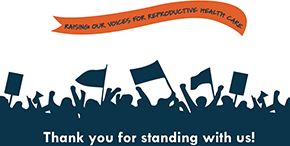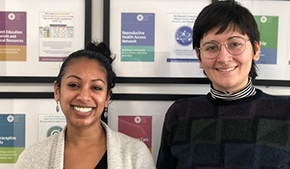Nov 06

Help Us Protect Access to Sexual and Reproductive Health Care Today!

Thanks to over 230 supporters, we raised more than $115,000 for our year-end campaign! Your support and the impact it has on clinicians and patients keep us inspired. Thank you for helping us raise our voices for reproductive health care and committing to expand access to reproductive health care. RHAP will now be able to expand to 5,000 clinicians and mobilize them to raise their voices to protect and expand access to reproductive health care.
We are ready to take on 2020 with full force by engaging clinicians to use their voice, platform, and power to speak out for accessible and safe reproductive health policies and laws. Thank you for standing with us as we build a national movement of primary care clinicians who are dedicated to providing and protecting access to abortion, contraception, and miscarriage care across the country.
At RHAP, we strive to keep our resources current, evidence-based, and patient-centered. We update our materials regularly and are constantly taking in feedback from colleagues, clinicians, and the public. We also have a built-in process to review one section of our resources – contraception, abortion, or early pregnancy loss – each year, to make any updates needed. In 2020 we will be reviewing our contraception resources, and we want to start by making sure our Birth Control Choices Fact Sheet is meeting your needs. Please lend your voice by responding to this survey. We want to hear if the wording makes sense, if the layout works for you, and any other feedback you’d like to give. If you respond to our survey, we will put your name in a lottery to win one of our lovely new RHAP tote bags.

2019 brought exciting changes and growth to the Reproductive Health Access Project and we are thrilled to announce the team members that joined us this fall.
Lily Trotta earned her B.S. in Media, Culture, and Communication at New York University, where she also minored in Creative Writing. Her introduction to advocacy was sparked by her time in the service industry, where rampant issues of discrimination and harassment based on gender, sexuality, race, and immigration status prompted a desire to inform and represent her peers in a more effective way. Coming from a background in event booking and customer service, Lily is committed to providing excellent support to the Reproductive Health Access Network.
Silpa Srinivasulu, MPH is a public health researcher and practitioner who focuses on sexual and reproductive health and rights. Silpa joins RHAP as its Research and Evaluation Manager. She previously worked as a Program Manager with the Institute for Family Health where she managed the Hands-on Reproductive Training (HaRT) Center, a project to increase the availability of comprehensive family planning services in New York City. While in graduate school, she participated in community-based participatory research to explore the experiences of patients and primary care providers in asking and responding to pregnancy intention screening questions. Her work has been published in a range of scientific journals including Contraception, Family Practice, Women’s Health Issues, and Progress in Community Health Partnerships. Silpa served as a Community Health Specialist with the Peace Corps in the Dominican Republic where she trained and mentored networks of community health promoters providing primary care and sexual education to families, schools, and youth. She is committed to incorporating a reproductive justice framework into her work, to ensure all people have access to high-quality and dignified sexual and reproductive health education, services, and care. Silpa earned her MPH from Columbia University Mailman School of Public Health, with a certificate in Public Health Research Methods.
RHAP worked closely with Silpa in her former role at the Institute for Family Health and we are thrilled to have her as an official RHAP staff member. As our Research and Evaluation Manager. she will be leading efforts to evaluate and strengthen the impact of our work. Some of the projects she will be working on include our Miscarriage Care Initiative, Reproductive Health Care and Advocacy Fellowship, and Reproductive Health Access Network.
 Last month the Reproductive Health Access Project attended a screening of the film “Ask For Jane,” hosted by students from Barnard’s Introduction to Women and Health class. The film tells the story of the Jane Collective, a group of women who started out facilitating safe, but illegal abortion referrals in the late 1960s in Chicago and later, before abortion was legalized nationwide, ended up performing abortions for women who could not afford to go to New York for legal abortions.
Last month the Reproductive Health Access Project attended a screening of the film “Ask For Jane,” hosted by students from Barnard’s Introduction to Women and Health class. The film tells the story of the Jane Collective, a group of women who started out facilitating safe, but illegal abortion referrals in the late 1960s in Chicago and later, before abortion was legalized nationwide, ended up performing abortions for women who could not afford to go to New York for legal abortions.
Dr. Jiana Menendez, a family physician member of our New York Reproductive Health Access Network, and Silpa Srinivasulu, RHAP’s Research and Evaluation Manager, led an interesting discussion about abortion access today and busted myths about abortion being a scary, unsafe, and traumatic procedure.
A key takeaway was acknowledging that while we technically live in a country where everyone has the right to abortion care, in reality, people in many parts of the country are grappling with the same lack of access to abortion care as the women in the “Ask for Jane” film. We discussed how people are now accessing safe abortion outside the medical system in places where abortion has been regulated and legislated out of existence. Fortunately, in 2020, safer options, like medication abortion, exist for people who are accessing care through underground referral networks similar to those in the Jane Collective. Instead of calling a landline, folks can use the internet to get information.
January 22nd is the 47th anniversary of the Supreme Court’s Roe v. Wade decision. We all should reflect on the progress we’ve made and what we have left to achieve.
Your gift allows us to train and support health care providers across the United States so they can offer patients compassionate and comprehensive care.
Nov 06
